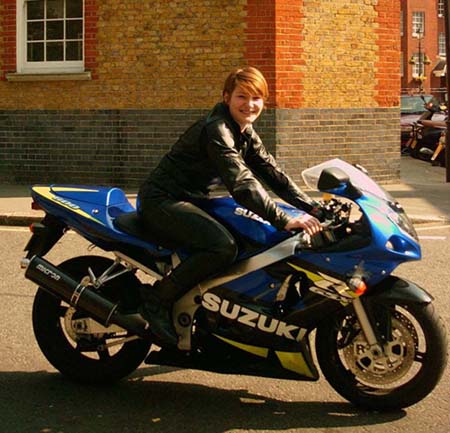One of the reasons for my absence on the blog was grieving for my motorbike that was stolen several weeks ago.

For some time now, my mood have been alternating between a profound sense of loss and anger with a burning desire to have my bike back preferably covered with puréed remnants of those who deprived me of it.
I decided to replace it as soon as possible and managed to do so earlier this week. The world seems a happier place, however, not as happy as it ought to be given that I am on two wheels again. This is because I had to switch to a different type of motorbike, which would not necessarily be my first choice.

For the uninitiated, my previous motorbike, Suzuki GSX-R600, is a pure sportsbike designed for a racetrack. It is a highly desirable motorbike both for joy riders but more importantly for thieves who sell them as parts for race bikes. This was certainly the reason my bike was stolen since the various security devices that I had installed would make it impossible to ride by anyone else.
My new bike, a Ducati Monster Dark 900, is a very different affair – bigger engine, stylish and urban. It is still desirable but to a different group of thieving criminals who I hope will be deterred by the bike’s security.
Both are top of the range in their category, so why am I not completely satisfied? The point is that I have been forced to change my preferences because there is a ‘market’ for the bikes I really like and their parts. Short of putting my dream bike in a bomb shelter and/or booby-trapping it with Semtex or some other owner-friendly material, there is nothing I can do to stop those thieving bastards from continuing to steal my sportsbikes.
There is a point to the stolen bike saga and it’s to do with property rights and their protection. My lovely Suzuki was the second sportsbike that I have had stolen in the last two years, so naturally, I have been wondering what to do about this – it is a problem that obviously will not go away, in fact, is getting worse. The local police have admitted that they can’t do anything to stop it and gave me a friendly advice, bordering on counselling, to treat the constant infringement on my property rights as the price one has to pay for living in Central London.
Perhaps, if my local council (a local government body in London) installed secure parking for motorbikes, it might make it more difficult for the thieves who would look for a more convenient bounty… Or perhaps if my street had CCTV cameras, the thieves would avoid it (or more likely find some clever ways of disabling them or simply ignore them)…. Or if the local residents decided to hire private security that would constantly patrol the area, the thieves might be permanently deterred…
I like the third option. Residents in three streets in Kensington (a desirable residential area in Central London) decided to do just that and the crime rate has been reduced to almost zero in the year the secret pilot scheme has been running.
As expected, the reactions have been mixed. The Sunday Telegraph reported this with a generally positive take:
Eldon street is a public street but the uniformed man with an Alsatian at his side making its way between the stucco-fronted buildings of one of London’s most desirable roads is not a public servant; he is not a policeman but a private – albeit highly-trained – security guard who keeps this Kensington avenue free from crime. The catch is that residents have to pay for the peace of mind they now enjoy; the scheme is funded by payments of up to £1,000 a year from householders.
However, the scheme has not left everyone happy. It was criticised by the Police Federation, which represents rank-and-file officers. The chairman of the constables’ branch of the Metropolitan Police Federation, said it was “denigrating the role of the policeman”:
The Government has announced it wants to introduce civilian auxiliaries under police control and also accredit private security firms to patrol streets…but by doing so, they are taking away the role of the police officer as a professional person and also getting policing on the cheap.
Hmm, £1,000 a year doesn’t seem so cheap, constable. Or perhaps your understanding of the cost is skewed by the knowledge of how much of taxpayer’s money is spent on ineffective policing…
The final twist on the story, which worried me more than finding the extra money on top of the local tax, was a throwaway line by the same policeman:
If rich communities can afford to do this, it is unfair on those areas which can’t.
I am not sure whom I detest more now – those who steal my property or those who take my money to protect me and my property, fail and then prevent me from doing so myself and from blowing up the criminals to the kingdom come. Let me think about that while getting used to riding my Ducati Monster Dark…



